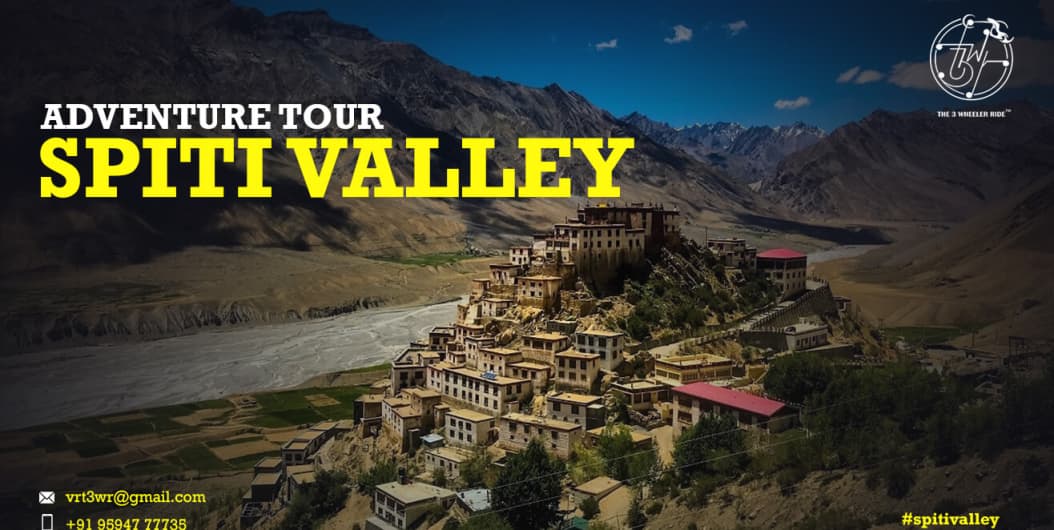Chronicles of Spiti Valley
Trip Date : 20th – 28th June ’20
Itinerary:
Day 01: Delhi to Shimla (7200 feet 8-10 hrs) - Participants travelling from mumbai will meet the trip leader at mumbai airport and participants travelling from cities other than mumbai will meet trip leader at delhi airport. We start our Spiti Valley tour from the wide and urban roads of Delhi Chandigarh and drive through the lush green countryside of the state of Punjab. Shimla is most favourite and visited hill station of India. Shimla, with its colourful bazaars and cool mountain air, is situated in the lower range of the Himalayas and is nestled at 7200 feet.We reach Shimla early morning and spend entire day resting and chilling around the mall road night at a comfortable hotel.
Day 02: Shimla to Sangla (8900 feets) - Today, we drive higher, into Sangla Valley, into the district of Kinnaur.The Batseri Village here is a must visit. An old-fashioned bridge built over the Baspa River leads you to Batseri and its cobble-stoned streets and the local temple of Badri Narayan. Art lovers have much to appreciate in the architecture. After this, visit the Kamru Fort – This five-storied tower type fort rests on 55 square feet of stone platform and was built by Dev Puran. The delicately intricate carvings of the wooden verandas and miniature temple are a sight to behold. We spend the night at a comfortable hotel / guest house in Sangla.
Day 03: Sangla to Chitkul – kalpa - Chitkul is the last Indian village at the frontier and has a population of roughly 700 people. The extensive Nila range where the greenish-blue Baspa River originates, corates India on one side and Tibet on the other. At a height of 3450m, Chitkul is picture-perfect The temples of the local Goddess, ‘Mathi’ are well-worth visiting as well; some of them are as old as 500 years. Post visit to chitkul we drive to Reckong Peo – the district capital of Kinnaur. From Reckong peo we head up higher on a seven kilometre winding road, to the quaint village of Kalpa – a gem of a little destination with enthrallingly majestic views of the Kinner Kailash and Jorkandan Peaks looming right above the village.While here, visit the striking Kinnauri-style temples or the colourful Samdrup Choeling Gompa. By the side of the Kinner Kailash is the 79 foot high single rock which resembles the Shivalinga, and is known for its ccolour-changing properties as the day wears on. We also visit famous Kalpa Suicide point. We spend the night at comfortable hotel in Kalpa.
Day 04: kalpa – Nako – Tabo : After a delicious breakfast, we continue driving on the Hindustan – Tibet Highway. On this stretch of the road, the colour of the landscape changes from an emerald lush green to a desolate brown as we drive on the what some call, ‘the world’s most treacherous and beautiful roads.’Your experienced driver will navigate these roads with great care and skill as you begin to embrace the jaw-dropping landscape. We pass through Puh – where we stop at the last fuel station on this stretch of the road. A refill later, we proceed to Nako – the last hamlet of Kinnaur, before we enter the gates of Spiti Valley. we cross into Spiti Valley through a traditional arch that welcomes us to Sumdoh. We continue driving into the rugged and arid terrain and takea pit stop to explore Gue.Gue is famous for a monastery that houses a 500 year naturally mummified monk. If legend is to be believed, the lama named Sangha Tenzin mummified himself to free his village from the plague of scorpions.We continue our journey and head to Tabo – also known as the ‘Ajanta of the Himalayas’. Tabo houses the 1010 year-old Tabo Monastery – which is a UNESCO world heritage site and is famous for its ancient paintings that depict the life of The Buddha, and intricate portraits of gods and demons along with life-size statues of bodhisattvas in a fusion of western Tibetan, Indian and Kashmiri styles. Overnight stay at a hotel in Tabo.
Day 05 : Tabo – Dhankar Monestry – Dhankar lake trek – Tabo : Today post breakfast drive towards Dhankar monestry, expreiance serenity enjoy the mother nature and then get ready for the most exciting trek dhankar lake trek, its beautiful lake on the top of dhankar monestry 2 hrs up and down enjoy the trek and we return back to tabo, visit tabo caves and over night at hotel in tabo.
Day0 6: Tabo – Lhalung – pin valley –Kungri - mudh - Kaza: Today post breakfast driver along the village of Lhalung located in the bottom of Tangmar Mountains. It is to be belief that mountain changes its colour deepening up on the mood of the god residing in the mountains. Then proceed towards Mudh Village in Pin valley, on the way visit kungri Monestry. Mud village is a part of a cluster of 17 villages of Pin Valley, housing around 200 people in its 30 homes. Bollywood stumbled upon this gem more than a decade and a half back. Remember the movie named ‘Paap,’ released in 2003? Its melodious songs were shot at Mud village in Pin Valley. Some other scenes of the movie were shot in Tabo village too. A striking feature of the village is how lush green it is, probably because the Pin river flows right beside the village. The river nourishes this land and enables its soil to harbor healthy crops. Mud village gained popularity among travelers for being a trekking base to Pin Parvati Pass, trek to Bhabha Pass and of course, the entrance to Pin Valley National park. Overnight at Kaza.
Day 07 : Kaza - Ki Monastery – Kibber – Kaza - Komik - Hikkim – Langza - Kaza
We begin the seventh day, with a drive to renowned Ki Monastery. The car will first stop at the base of the monastery hill for the ultimate photo opportunity of this remarkable structure amid white snow. With over 1000 years’ worth stories to tell, the Ki Monastery situated at a height of 13,668 feet was founded by a disciple of the famous Atisha, in the 11th century CE. Belonging to the Yellow Hat or Gelugpa sect of Tibetan Buddhism, this monastery is famous as a prominent center of learning as well as a refuge for Tibetans. Being remotely located atop a hill overlooking endless plains, the Ki Monastery is an obvious choice for those seeking peace and calm.
Then we will move farther up the valley to the picturesque village of Kibber. Located at a height of 4205 meters and 18 km from Kaza, this formerly highest permanently inhabited village in this region, is also a popular base camp to embark on adventure and treks to adjoining mountains of high altitude. The expanses of beautiful landscapes and immeasurable beauty of the snowy mountains make the place a haven for nature-lovers and photographers alike. From Kibber you can trek to Chicham Village, located across a sharp and precipitous canyon traversible only by a suspended wire cable basket system known as a Jula.
The highest village in Asia, Komik, which literally translates to ‘eye of a snow cock’, is situated at a height of 4513 meters. This farming village has a population of 84 people, living in utter isolation, mostly cut-off from the rest of the world during this part of the year. If accessible during this tour, we will make the drive to Komik. Some of the common animals of the region are the Tibetan wolf, blue sheep, red fox, hare, snow cock, Himalayan griffin, rock pigeon etc.
Later, we drive to Hikkim where we visit the world’s highest post office in the world. If possible, you might even meet the post-master and hear his stories.
After sending out a postcard, we drive to Langza. Langza village is situated at an altitude of 4400 meters and belongs to the Sakyapa sect of Tibetan Buddhism. Langza houses a population of 137 in 33 households. Once you are here, you can walk around the frosty-white village and visit the ancient Lang (Temple) which is estimated to be around 1000 years old. At Langza, walk back to the prehistoric era when Spiti was submerged by the Tethys Sea, as you explore a land very rich with fossils of Marine animals and plants which were here millions of years ago.
Day 08: Kaza – Kumzumla – Chandratal – Rohtang pass - Manali
Today early morning drive towards Kumzumla pass, around 15000 feets, connects spiti valley and lahul valley. The route post that is one of the best route I have ever witnessed over the years. Its magnificent route very less taken on the way chandratal lake, click pictures enjoy the view and head towards Rohtang pass. Now the actual adventure starts there is actually no roads in between, ur driving in between if nowhere is the feeling one gets while driving towards Rohtang pass. There will be no vhicels around no network and even google map doesn’t show this route. But we assure you its safe, beautiful and admirable. By evening reach manali. Overnight at Manali.
Day 09: Manali – Chandigarh
Today wake up early drive towards Chandigarh. Reach chandigarh by around 3.00 pm. Journey ends with loads of happy memories. Book onward flight post 05.00 Pm.
Cost Includes:
# Accommodation in Hotels/Home stays on triple sharing. (Double sharing available on request)
# Breakfast from Day 2 to Day 9.
# Dinner from Day 2 to Day 8.
# Pvt vehicle for sightseeing from day 2 to day 8.
# Entry tickets and permit as per itinerary.
# Airport Transfers both ways.
# Trip leader
Cost Excludes:
# Lunch on all days.
# Any personal expenses.
# Travel till Delhi and From Chandigarh Airport.
# Anything not mentioned in inclusions.
















